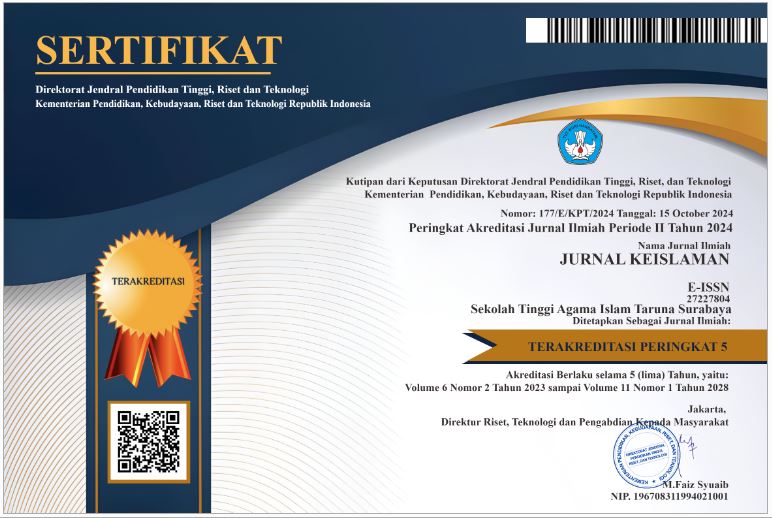Pengelolaan Pembelajaran Pendidikan Agama Islam (PAI) Berbasis Ekologis di Sekolah Dasar (SD) Plus Al-Qodiri Jember
DOI:
https://doi.org/10.54298/jk.v7i2.275Keywords:
Learning Management, Islamic Education, EcologicalAbstract
This research aims to describe the problems that occur to students in educational institutions and efforts to overcome them. The problems of students include the increasingly weakening character or morals of students inside and outside the madrasah, the lack of application of Islamic values by students to their environment, and the lack of contribution of students in broadcasting the Islamic religion in society. The efforts that can be made to overcome this problem are the application of ecologically based educational methods in learning, especially in Islamic religious learning (PAI). PAI learning has a strategic role in implementing environmental awareness values because it must be provided at all levels of education. This research aims to formulate goals and steps in realizing environmental awareness through ecologically based PAI learning management. That is, in conducting research we carry out a descriptive qualitative research method with an intrinsic case study type of research. The results of this research ensure that students can implement Islamic values in protecting the environment by means of Ecologically Based Islamic Education Learning Management. From this description, it is clear that Ecologically Based PAI Learning Management can be a locomotive in increasing students' enthusiasm for learning to carry out activities outside the classroom and inside the classroom.
Downloads
References
Abu Rizal Akbar, Danial, dan Rahman, "PROBLEMATIKA YANG DIHADAPI LEMBAGA PENDIDIKAN ISLAM SEBAGAI TANTANGAN DALAM MENINGKATKAN MUTU PENDIDIKAN."Journal of Management Education 1, no 1 (2021): 76-89.
Arman Husni, Arifmiboy, Muhiddinur Kamal, dan Ulia Syafrin, “PELAKSANAAN PEMBELAJARAN PENDIDIKAN AGAMA ISLAM” Jurnal Pendidikan 2 no, 1 (2023), https://doi.org/10.56248/educativo.v2i1.111
Dakhi, “IMPLEMENTASI MODEL PEMBELAJARAN COOPERATIVE PROBLEM SOLVING UNTUK MENINGKATKAN KREATIVITAS DAN PRESTASI BELAJAR”, Jurnal Pendidikan 1 no. 1, (2022). https://doi.org/10.56248/educativo.v1i1.2
Dewi Ratna, “INTEGRASI PENDIDIKAN ISLAM DALAM IMPLEMENTASI EKOLOGI” Jurnal Mutu Kajian Pendidikan 4, No 2 (2021) https://jurnal.lp2msasbabel.ac.id/index.php/sus
Fahmi Muhammad, Ahmad Zainal Abidin, “TAFSIR EKOLOGIS DAN PROBLEMATIKA LINGKUNGAN”, Jurnal Studi Al-Qur’an Dan Tafsir 4 No. 1 (2020), https://doi.org/10.30762/qof.v4i1.1990.
Meldiana Harun, Samsi Pomalingo, dan Isnanto, “STRATEGI PENGELOLAANKELAS DI SEKOLAH DASAR”, Jurnal Pendidikan Glasser 4 No. 1 (2020), http://10.32529/glasser.v4i1.392
Oskah Dakhi, NeviYarni, Maria Magdalena Zagoto, “PERBEDAAN INDIVIDU DARI GAYA BELAJARNYA SERTA IMPLIKASINYA DALAM PEMBELAJARAN”, Jurnal Review Pendidikan dan Pengajaran 2 no. 2 (2019), 259-265. https://doi.org/10.31004/jrpp.v2i2.481
Salamah Nurus Siti, GURU PAI, wawancara, Jember 31 Agustus 2024
Zagoto, “PENINGKATAN HASIL BELAJAR MAHASISWA MELALUI IMPLEMENTASI MODEL PEMBELAJARAN KOOPERATIF WORD SQUARE”, Jurnal Pendidikan 1 no. 1 (2022), https://doi.org/10.56248/educativo.v1i1.1
Downloads
Published
How to Cite
Issue
Section
License
Copyright (c) 2024 M. Abdul Azis, Syaiful Rizal

This work is licensed under a Creative Commons Attribution-ShareAlike 4.0 International License.
Authors who publish with this journal agree to the following terms:
- Authors retain copyright and grant the journal right of first publication with the work simultaneously licensed under a Creative Commons Attribution-ShareAlike 4.0 that allows others to share the work with an acknowledgement of the work's authorship and initial publication in this journal.
- Authors are able to enter into separate, additional contractual arrangements for the non-exclusive distribution of the journal's published version of the work (e.g., post it to an institutional repository or publish it in a book), with an acknowledgement of its initial publication in this journal.
- Authors are permitted and encouraged to post their work online (e.g., in institutional repositories or on their website) prior to and during the submission process, as it can lead to productive exchanges, as well as earlier and greater citation of published work (See The Effect of Open Access).


















